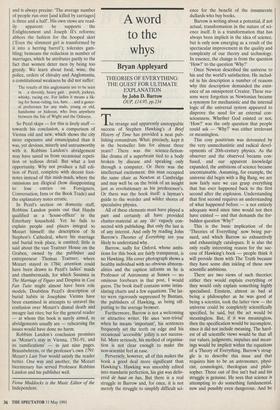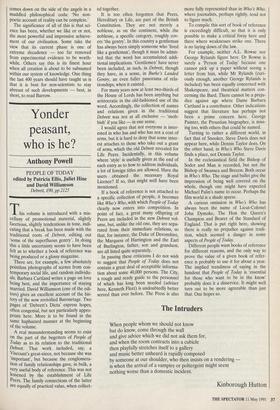A word to the whys
Bryan Appleyard
THEORIES OF EVERYTHING: THE QUEST FOR ULTIMATE EXPLANATION by John D. Barrow OUP, f14.95, pp.234 The strange and apparently unstoppable success of Stephen Hawking's A Brief History of Time has provided a neat pub- lishing conundrum. What, precisely, kept it in the bestseller lists for almost three years? There was the science-fiction- like drama of a superbrain tied to a body broken by disease and speaking only through a computer. Or there was the intellectual excitement: this man occupied the same chair as Newton at Cambridge and may well be on the brink of an insight just as revolutionary as his predecessor's. Or there was the book itself: a layman's guide to the weirder and wilder shores of speculative physics.
All of these elements must have played a part and certainly all have provided chatter-material at any `do' vaguely con- nected with publishing. But only the last is of any interest. And only by reading John Barrow's Theories of Everything are you likely to understand why.
Barrow, sadly for Oxford, whose ambi- tions for this book are fairly transparent, is no Hawking. His cover photograph shows a healthy individual with no obvious abnorm- alities and the caption informs us he is Professor of Astronomy at Sussex — no ominous forebears in that post, I would guess. The book itself contains some intim- idating charts and a few equations. The lat- ter were rigorously suppressed by Bantam, the publishers of Hawking, as being off- putting to the average browser.
Furthermore, Barrow is not a welcoming or attractive writer. He uses `non-trivial' when he means 'important', his sentences frequently set the teeth on edge and his occasional 'accessible' jollity is not success- ful. More seriously, his method of organisa- tion is not clear enough to make the non-scientist feel at ease.
Perversely, however, all of this makes the book a good deal more significant than Hawking's. Hawking was smoothly edited into mandarin perfection, his gist was deliv- ered de haut en bas. But there is a real struggle in Barrow and, for once, it is not merely the struggle to simplify difficult sci- ence for the benefit of the innumerate dullards who buy books.
Barrow is writing about a potential, if not actual, transformation in the nature of sci- ence itself. It is a transformation that has always been implicit in the idea of science, but is only now emerging as a result of the spectacular improvement in the quality and complexity of our theory and technology. In essence, the change is from the question `How?' to the question 'Why?'
Once Newton described the universe to his and the world's satisfaction. He includ- ed in his description a number of reasons why this description demanded the exist- ence of an omnipotent Creator. These rea- sons were forgotten as Newtonian became a synonym for mechanistic and the internal logic of the universal system appeared to disprove the need for an external con- sciousness. Whether God existed or not, `How?' was the only question that people could ask — 'Why?' was either irrelevant or meaningless.
This cosy positivism was detonated by the very unmechanistic and radical devel- opments of 20th-century physics. As the observer and the observed became con- fused, and our apparent knowledge expanded, the ambitions of science became uncontainable. Assuming, for example, the universe did begin with a Big Bang, we are now fairly sure we can grasp everything that has ever happened back to the first second after the explosion. Understanding that first second requires an understanding of what happened before — a not entirely adequate word since time would not then have existed — and that demands the for- bidden question 'Why?'
This is the basic implication of the `Theories of Everything' now being pur- sued, and which Barrow so exhaustively and exhaustingly catalogues. It is also the only really interesting reason for the suc- cess of Hawking's book — people think it will provide them with The Truth because they have some dim inkling of these new scientific ambitions.
There are two views of such theories: either they would explain everything or they would only explain something highly specialised. Einstein, almost as bad at being a philosopher as he was good at being a scientist, took the latter view — the universe could be completely scientifically specified, he said, but the act would be meaningless. But, if it was meaningless, then the specification would be incomplete, since it did not include meaning. The hard- est of all scientific views would be that all our values, judgments, impulses and mean- ings would be implicit within the equations of a Theory of Everything. Barrow's strug- gle is to describe this issue and that requires him to be an astronomer, physi- cist, cosmologist, theologian and philo- sopher. Three out of five isn't bad and his struggle is genuine. He sees that science is attempting to do something fundamental, new and possibly even dangerous. And he comes down on the side of the angels in a muddled philosophical coda: 'No non- poetic account of reality can be complete.'
The significance of all of this is that sci- ence has been, whether we like or or not, the most powerful and impressive achieve- ment of our civilisation. Some take the view that its current phase is one of extreme decadence — too far removed from experimental evidence to be worth- while. Others say this is its finest hour when all creation is about to be subsumed within our system of knowledge. One thing the last 400 years should have taught us is that it is best for non-scientists to stay abreast of such developments — best, in short, to read Barrow.



























































 Previous page
Previous page